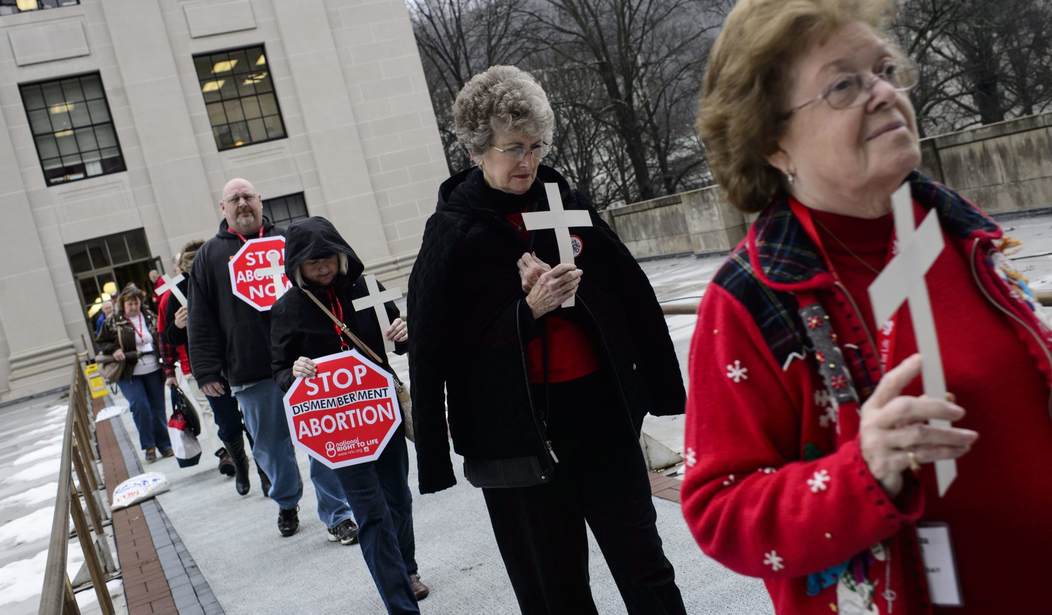Abortion-rights activists wearing red-and-white “handmaiden” robes weren’t enough to dissuade the West Virginia Senate from approving a measure that would make it clear no woman in the state has a constitutional right to receive an abortion.
Pro-life state Sen. Robert Karnes (R) said it’s hoped the proposed constitutional amendment would help reverse a 1993 Supreme Court decision that mandated West Virginia taxpayers pay for Medicaid-funded abortions.
West Virginia, according to the Guttmacher Institute, is one of 17 states that provide Medicaid-funded abortions, a policy that Karnes argues forces taxpayers to foot the bill for the procedures.
Karnes also told the Charleston Gazette-Mail that should the U.S. Supreme Court ever overturn Roe v. Wade the constitutional amendment would clear the way for West Virginia to ban all abortions, whether they are paid with taxpayer money or not.
“Today’s been quite a rollercoaster for women’s health advocates,” said Margaret Chapman Pomponio, executive director of the abortion-rights group West Virginia Free.
“We were lambasted by this constitutional amendment, which is incredibly severe,” Chapman Pomponio also said.
West Virginia Free isn’t giving up. The group used its Facebook page to rally the troops who support abortion rights to lobby their senators to defeat SJR 12.
From the other side of the debate, as soon as the Senate gave final approval to the proposal, West Virginians for Life used its Facebook page to rally the pro-life group’s members into a grassroots lobbying campaign for the two-thirds House approval needed to put the constitutional amendment on a public ballot in November.
West Virginia’s SJR 12 proposal is the same as a Tennessee constitutional amendment that reads, “Nothing in this Constitution secures or protects a right to abortion. The people retain the right through their elected state representatives and state senators to enact, amend, or repeal statutes regarding abortion, including, but not limited to, circumstances of pregnancy resulting from rape or incest or when necessary to save the life of the mother.”
The Tennessee amendment, which was approved in 2014, survived a federal appeals court challenge one month before the West Virginia Senate passed SJR 12.
“Although the subject matter of abortion rights will continue to be controversial in Tennessee and across the nation, it is time for uncertainty surrounding the people’s 2014 approval and ratification of Amendment 1 to be put to rest,” the 27-page ruling concluded.
A Tennessee Right to Life statement said the amendment was needed only because of “a radical pro-abortion decision by the Tennessee Supreme Court in 2000 which wrongly declared a so-called ‘fundamental right to abortion’ in the Tennessee Constitution thereby making enforcement of common-sense protections impossible in Tennessee.”
Bill Harris, president of Tennessee Right to Life, called the ruling a “victory for thousands of pro-life Tennesseans.”
“The voices of Tennessee’s voters have been heard,” Harris added. “As a result, public policy decisions on the matter of abortion can be rightly debated and determined by the people’s representatives.”
Sen. Karnes said the court’s decision in the Tennessee case made it clear that the legislature could approve SJR 12 without being concerned a judge might derail their efforts.
“There’s been no successful challenges whatsoever to the notion that it is the Legislature’s prerogative in the state of Tennessee to control abortion to whatever degree the Legislature wants to – under, obviously, the federal judicial umbrella that has made significant decisions related to abortion,” Karnes told West Virginia Metro News.
Assuming the West Virginia Senate approves SJR 12, the final call will still be up to the state’s voters in November. Chapman Pomponio told Metro News she is confident that most West Virginians do not want abortion declared illegal and banned.
West Virginia Free released a poll in January that showed 65 percent of the state’s voters supported the state’s Medicaid insurance plan that covers reproductive healthcare services including abortions.
Even more, 69 percent of voters agreed with the statement that “regardless of how one feels about abortion, politicians should not be allowed to deny a woman health coverage for it just because she is poor.”
“I have to say, as an advocate that has her hand on the pulse of what West Virginians want –this is not it,” Chapman Pomponio said. “We’re deeply troubled that there are so many politicians here who just want to play politics with women’s health.”
A Charleston Gazette-Mail editorial said the West Virginia House would be making a mistake if it followed the Senate’s lead.
“Of course, people who count themselves as pro-choice don’t argue for abortion as a desirable outcome,” read the editorial. “Instead, they recognize that in this imperfect world, not all pregnancies are conceived in love, or even consent. Not all are healthy or viable. Some are tragic.”
“But that tragedy is compounded,” the Gazette-Mail opined, “when people unknown and unrelated to [a woman or girl] make decisions about her body, her future and her family, in advance, from a safe and anonymous distance, based on their own assumptions and ideals.”









Join the conversation as a VIP Member